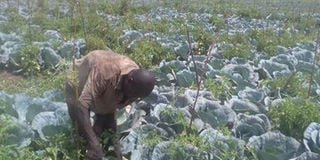Gulu losing battle to save wetlands

Illegal activity. Mr Michael Gidudu tends to his tomato garden in a gazetted wetland in Queens Parish, Laroo Division, Gulu Municipality. PHOTO BY JULIUS OCUNGI
What you need to know:
- Concern. Encroachers continue to grow food in the wetlands under the watch of leaders.
Gulu.
Wetland cover in Gulu Municipality is fast disappearing due to heavy environmental degradation and encroachment despite concerted initiatives by the district environment department to conserve the available wetlands.
Countless eviction threats to encroachers have since 2016 been issued by district leaders, including the Resident District Commissioner, Cpt Santos Okot Lapolo.
The municipal environment department last year embarked on demarcating the boundaries on the 25km stretch of the wetlands within the municipality.
Despite these efforts, people continue to encroach on the wetlands for farming, sand mining and settlement.
Statistics from the municipal environment department indicate that 60 per cent of the wetlands have been already destroyed, a trend environmentalists warn may lead to an ecological disaster.
Mr Michael Gidudu, a vegetable farmer, currently owns half an acre of land in Queens Parish, Laroo Division, Gulu Municipality on a gazetted wetland with visible mark stones.
However, Mr Gidudu says he has been growing cabbages and tomatoes on the farm for the last two years but has never been approached by any municipality official to stop the practice.
“We are renting this land from some lady in the area, who claims to be the land owner. The other portion of land we are using it for free. We have also in the past been paying some money from people who claim they are from the municipal environment department,” he says.
According to Mr Gidudu, although environmentalists accuse them of degrading the wetlands, they have instead been preserving them by opening wider water channels.
“This place was bushy and neglected by the community. When we hired it, it took us several days to clear bushes to become a farm. We have protected this area through farming activities as you can see,” he said.
Encroachers speak out
Mr Martin Mawanda, another vegetable farmer, says the hospitable environment provided by the municipal authorities have enabled them to continue farming in the wetland despite knowing its impact on the environment.
He alleges that ahead of the 2016 general election, the current municipality mayor, Mr George Labeja, while campaigning, promised residents that they would be allowed to carry on farming on the wetlands if they voted him in office. “We were promised protection and we did our best to vote him in office. May be this is the reward we are getting, there were threats later in 2016 for us to leave but all this calmed down. As for me, I am ready to leave but if the opportunity still stands, I will continue farming here,” Mr Mawanda says.
When contacted, Mr Labeja declined to comment on the allegation, saying he will only respond after meeting the encroachers next week. The speaker, Mr Peter Onen Akera, however, says failure to enforce policies has remained the biggest obstacle to evicting wetland encroachers.
He said last year, the council enacted by-laws to evict the encroachers from all wetlands in the municipality but to date, no enforcement has been done.
Poor enforcement
“As leaders at the grass root, we understand the dangers these farmers are putting on the available wetlands, we are witnessing water levels receding and flood. We, however, cannot start evicting them minus the higher authorities intervening,” Mr Akera says.
He is also concerned that some of the vegetable being grown in the wetlands are contaminated with faecal matter and urine.
“This area is congested with people settling on what should have been a wetland, they do not have proper ways of disposing off human waste and most of it ends in the streams used to water vegetables. They should be evicted for the safety of people who consume vegetables from such areas,” Mr Akera says.
The district chairperson, Mr Martin Ojara Mapenduzi, says his office has received reports of the growing wetland destruction in the municipality, adding that they will soon implement the eviction order.
He also says he will investigate allegations that the mayor, Mr Labeja, is shielding encroachers.
However, the municipal environment officer, Mr James Ocaka, says the process of evicting encroachers delayed because they are still assessing and demarcating wetland boundaries.
“Eviction is a process. We need to assess those who are within the wetland and know how much will be used to compensate them. Besides, we still have wetlands in Layibi and Pece divisions that haven’t been demarcated,” he says.
Other wetlands being degraded in the municipality are Pece, Oyitino and Layibi, where papyrus swamps have been reclaimed for sugar cane growing.




